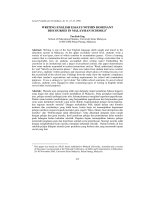Wrong in english 8 pot
Bạn đang xem bản rút gọn của tài liệu. Xem và tải ngay bản đầy đủ của tài liệu tại đây (167.77 KB, 6 trang )
DOUBLING
RULE
I
wouldn't
be
surprised
if he
didn't
come.
Say
either:
I
wouldn't
be
surprised
if he
came,
or: I
would
be
surprised
if he
didn't come.
Sometimes
writers
put so
many negatives
in a
sentence that
the
meaning becomes
too
complicated
to
unravel:
Mr
Brown denied vehemently that
it was
unlikely
that
no one
would come
to the
concert.
Does
Mr
Brown think that
the
concert will
be
popular
or
not?
Rewrite
as
either:
Mr
Brown
was
certain
the
concert would
be
well
attended.
Or:
Mr
Brown
feared
that
no one
would come
to the
concert.
doubling
rule
See
ADDING
ENDINGS
(i) and
(iv).
doubt
(not
dout)
The
word
is
derived
from
the
Latin
word
dubitare,
to
doubt.
It may
help
you to
remember that
the
silent
b is
there.
Down's
syndrome
(not
Downe's)
downstairs
(one word)
draft
or
draught?
A
DRAFT
is a first or
subsequent attempt
at a
piece
of
written work before
it is finished.
A
DRAUGHT
is a
current
of
cool
air in a
room.
74
DUE
TO/OWING
TO
One
also
refers
to a
DRAUGHT
of
ale,
a
game
of
DRAUGHTS
and a
boat having
a
shallow
DRAUGHT.
drawers
or
draws?
DRAWS
is a
verb.
She
DRAWS
very well
for a
young child.
DRAWERS
is a
noun.
The
DRAWERS
of the
sideboard
are
very
stiff.
dreamed/dreamt
Both
spellings
are
correct.
drier
or
dryer?
DRIER
is
generally used
for the
comparative
form
(DRIER
=
more
dry).
DRYER
is
generally used
for a
drying machine (hair
DRYER,
clothes
DRYER)
However, both spellings
are
interchangeable.
drunkenness
drunken
+
ness
dryness
(exception
to the -y
rule)
See
ADDING ENDINGS
(iii).
dual
or
duel?
DUAL
means
two
(e.g.
DUAL
controls,
DUAL
carriageway).
DUEL
means
fight or
contest.
duchess
(not
dutchess)
due
to/owing
to
Strictly
speaking,
'due
to'
should refer
to a
noun:
His
absence
was DUE TO
sickness,
(noun)
The
delay
was DUE TO
leaves
on the
line,
(noun)
'Owing
to',
strictly speaking, should refer
to a
verb:
75
DUEL
The
march
was
cancelled
OWING
TO the
storm.
(verb)
OWING
TO an
earlier
injury,
he
limped badly.
(verb)
However,
in
recent years,
the use of
'due
to'
where
traditionally
'owing
to'
would
be
required
has
become widespread. Nevertheless, some
careful
writers continue
to
preserve
the
distinction
and you
may
wish
to do so too in a
formal context.
duel
See
DUAL
OR
DUEL?.
duly
(not
duely)
This
is an
exception
to the
magic
-e
rule.
See
ADDING ENDINGS (ii).
dutchess
Wrong
spelling.
See
DUCHESS.
dwelled/dwelt
Both
spellings
are
correct.
dyeing
or
dying?
DYEING
comes
from
the
verb
to
dye.
She
was
DYEING
all her
vests green.
DYING
comes
from
the
verb
to
die.
She
cursed
him
with
her
DYING
breath.
76
earnest
or
Ernest?
EARNEST
=
serious
and
sincere
ERNEST
=
masculine
first
name
echo
(singular) echoes (plural)
See
PLURALS
(iv).
economic
or
economical?
ECONOMIC
=
related
to the
economy
of the
country,
or
industry
or
business
ECONOMICAL
=
thrifty,
avoiding extravagance
ecstasy
(singular) ecstasies (plural)
See
PLURALS
(iv).
77
Ecstasy
illegal drug
eczema
-ed or -t?
These
can be
either:
burned burnt
dreamed dreamt
dwelled
dwelt
kneeled knelt
leaned leant
leaped leapt
learned learnt
smelled smelt
spelled spelt
spilled spilt
spoiled
spoilt
eerie
or
eyrie?
EERIE
=
strange, weird, disturbing
EYRIE
= an
eagle's nest
E
effect
See
AFFECT
OR
EFFECT?.
effective,
effectual
or
efficient?
EFFECTIVE
=
able
to
produce
a
result:
an
EFFECTIVE
cure
an
EFFECTIVE
speech
EFFECTUAL
=
likely
to be
completely
successful:
EFFECTUAL
prayer
EFFECTUAL
legislation
EFFICIENT
=
working well without wasting time,
money
or
effort:
an
EFFICIENT
secretary
an
EFFICIENT
engine
ei/ie
spelling
rule
Remember
the
jingle:
i
before
e
except
after
c
or
when sounded like
a
as
in
'neighbour'
and
'weigh'.
Here
are
some examples which follow
the
rule.
There
are
plenty
of
others.
ie ei
after
c
achieve ceiling
believe conceited
chief
conceive
field
perceive
friend
receive
hygiene
ei
sounding like
a
priest eight
relief
reign
retrieve reindeer
shield skein
shriek
sleigh
thief
vein
78
EFFECT
EITHER
OR
Proper names
(e.g.
of
people
or
countries)
don't
follow
the
rule: Deirdre, Keith,
Neil,
Sheila, Madeira,
etc.
eighth
(notice
-hth)
See
EI/IE
SPELLING
RULE.
either
(not
-ie-)
An
exception
to the
EI/IE SPELLING RULE.
either
.or
(i)
Take care with singular
and
plural verbs.
Use
these exemplar sentences
as a
guide:
Either
Jack
or Tom was
there,
(singular verb
to
match Jack (singular)
or Tom
(singular))
Either
Jack
or his
brothers were
there,
(plural
verb
to
match
'brothers'
(plural) which
is
closer
to it
than
'Jack'
(singular))
Either
his
brothers
or
Jack
was
there,
(singular
verb
this time because
'Jack'
(singular)
is
closer
to the
verb than
'brothers')
(ii)
Be
careful
to
place each part
of the
'either
or'
construction correctly.
I
have decided either that
I
have
to
build
an
extension
or I
have
to
move.
I
have decided that either
I
have
to
build
an
extension
or I
have
to
move.
79
18
exceptions
caffeine
forfeit
seize
codeine heifer sheikh
counterfeit
height sovereign
either
leisure
surfeit
Fahrenheit neither weir
foreign
protein
weird
t









